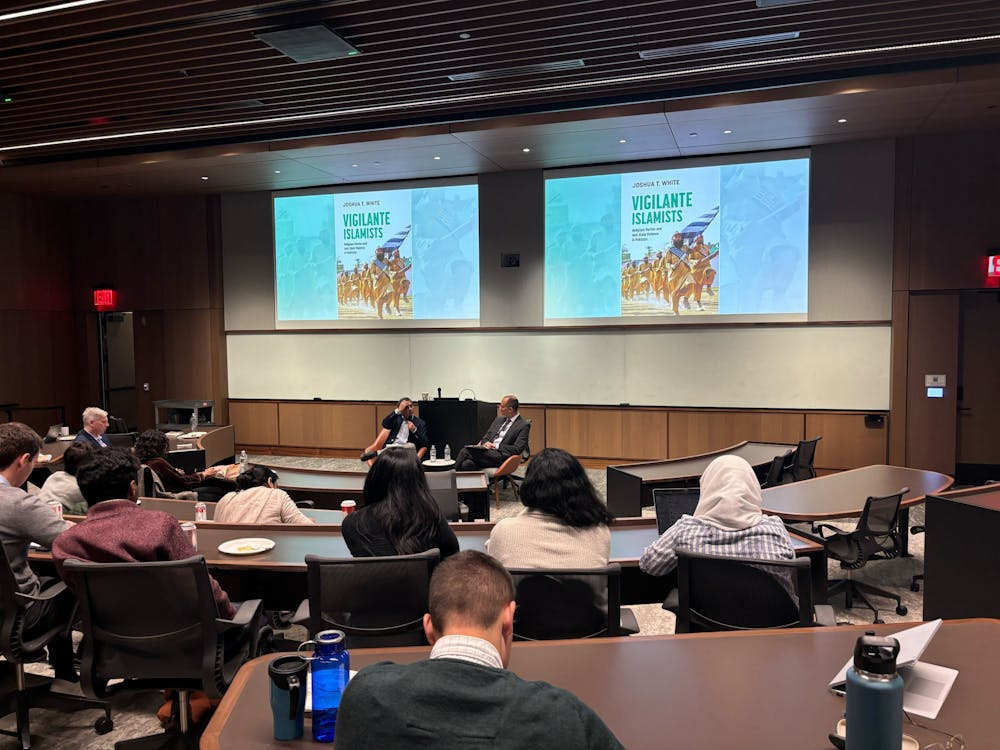On Thursday, Oct. 16th, the School of Advanced International Studies (SAIS) Office of Faculty Affairs hosted an event with Professor Joshua White regarding his book Vigilante Islamists: Religious Parties and Anti-State Violence in Pakistan.
In an email to The News-Letter, the SAIS Office offered comments on the planning and purpose behind hosting the faculty book talks as part of its ongoing academic programming.
“We typically plan these events a semester in advance based on the faculty's availability. To date, we have organized similar events centered around books written by SAIS faculty members such [as] Kent Calder’s Eurasian Maritime Geopolitics and Andrew Mertha’s Bad Lieutenants — to list a few from this year. [...] Anyone who registers for the event can attend,” they wrote. “Faculty members discuss the general themes of their research and writing, resulting in an organic discussion with audience members. This has been the format of the event for years and will continue to be so.”
The event began with a background lecture from White on the book itself after introductory remarks by the vice dean for faculty affairs, Peter M. Lewis. The book consists of case studies, interviews with party insiders and internal documents, and examines how Pakistan’s Islamist political parties have interacted with violent anti-state movements since the 1990s.
In his presentation, White explained how he selected the cases that included in the article. He describes that he selected five major cases of religiously motivated violence against the state in Pakistan, spanning from the 1980s to today. Each case, he noted, revealed different forms of Islamist challenges to state authority, from vigilante movements to the infamous Red Mosque incident (a 2007 incident when there was an armed confrontation in Islamabad, Pakistan) and violent anti-blasphemy campaigns.
To analyze these events, White combined interviews, government documents and internal party data, even uncovering confidential directives showing how Islamist officials used state resources to strengthen their networks.
“There was the case from the post-2002 government — that I saw firsthand — where the government had to deal with vigilante movements in its own ranks [...] The government tried to raise its own religious police force,” White explained. “In my favorite case, they decided that they were going to ban cable TV because it is, of course, of the devil and then they got pushed back because students love [World Wrestling Entertainment (WSE)]. So there was a real backlash, and they had the students calibrate, but this was a vigilante violence that came to me in their own ranks.”
White also explained how he framed the arguments presented in the book, focusing on the complex incentives that drive Islamist parties to engage with militant groups despite their formal participation in government.
“The first question is [...] if you’re an upstanding political party that benefits from the patronage of power [...] why would you support a group that’s trying to topple the government?” he asked. “One is ideological sympathies. [...] The second is [...] that Islamist parties in Pakistan and elsewhere create useful symbiotic links with more violent militants.”
White elaborated on these mutually beneficial relationships between Islamist political parties and militant groups. These connections allow for parties to discreetly use violence to weaken opponents while offering militants political protection and insider information.
White noted that these ties help both sides to maintain influence as political parties gaining leverage against rivals while militants would gain legitimacy. Ultimately, he argued that such alliances also help parties manage competition to keep their followers form drifting toward more radical groups.
Following the lecture, a panel discussion was held with Devesh Kapur, a professor of South Asian Studies. During the discussion, the pair conversed on various topics explained in the book and delved deeper into the economic and social mechanisms that sustain Islamist parties and militant networks. For example, the conversation touched on topics such as sources of funding and recruitment, particularly how young men decide to join one organization over another.
“None of these parties are are that wealthy, but they do raise money from some of their members, and they have some state patronage through the mosque,” White explained. “The government run mosques, but this is the reason why they want to build links with militant groups — because it’s advantageous for them to build a pipeline where (and I see this in some of these villages) where madrasas will deliver a certain number of young men to a group in exchange for support from that militant group, and that military group is involved in extortion.”
The discussion highlighted how financial and social interdependence reinforces the connections between Islamist parties and militant organizations, revealing the deep entanglement between politics, religion and local economics.
After the event, audience members reflected on the lecture’s nuanced exploration of these dynamics and how they shape regional stability.
Berth Mulay, a second-year student at SAIS, explained that the event offered valuable insight into issues that resonated with him personally in an interview with The News-Letter.
“The event was really interesting and really informative [by] Professor Joshua White — who’s a South Asia expert. [I looked] forward to hearing his thoughts, because I come from South Asia as well,” Mulay shared. “The specific topic that he’s talking about has sort of hit deep back home for me, so it’s always great to hear some thoughts about it. Also, given that he’s not from India or Pakistan and comes from a third country, it gives a really impressive and really informative perspective.”
In an interview with The News-Letter, first-year Master of Arts in International Relations (MAIR) student Patrick Clifford described how the lecture broadened his understanding of political networks in South Asia.
“Fascinating event,” he said. “[The] main takeaway was, I had no understanding of the dynamics between the local dynamics in Pakistan — between the Islamist parties and militant groups, so it’s really interesting seeing the connections.”





